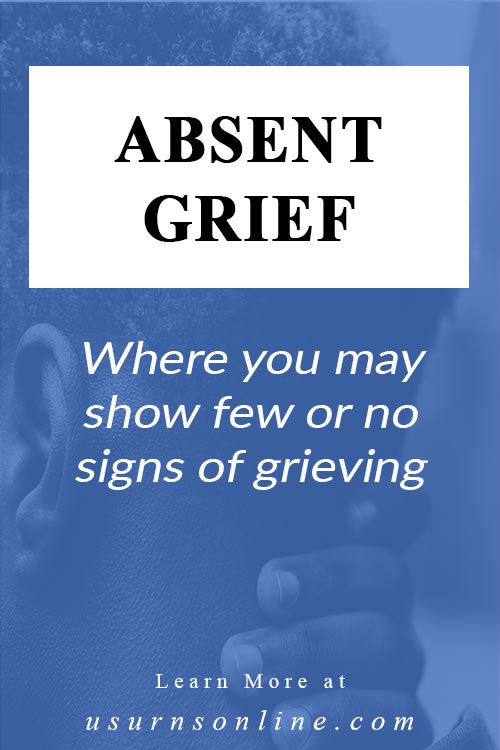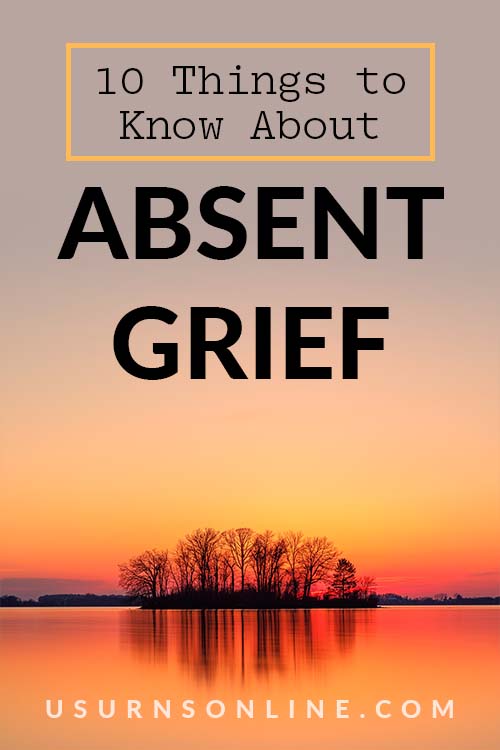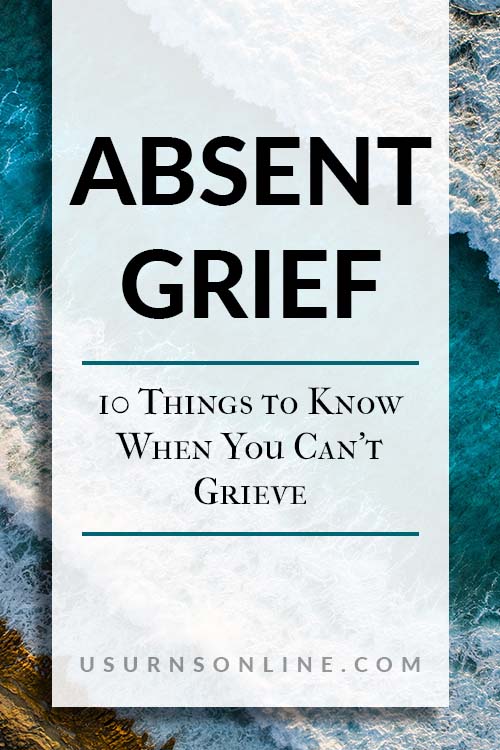Losing a loved one is one of the hardest things you will ever go through. Working through your grief is going to help you heal.
But what if you can’t grieve? What if it feels like your emotions have been put on hold? Is this normal, or should you seek help?
There is such a thing as absent grief.
Grieving is normal. We will all go through it at some point in our lives. Read and learn how to work through this journey called grief.
Absent Grief Definition

Those who suffer from absent grief show little to no symptoms of normal grief. Many psychologists believe this stems from an underlying avoidance or denial of loss.
Of course you know that your loved one is gone; but the lack of grief symptoms results from being stuck in the first stage of grief (denial) and resistance to getting to the “acceptance” stage.
While this is not “normal” or typical, it is a known condition for those who have suffered a loss, so take heart – you are not alone in this! Others have experienced it, and there is help and healing for you.
Absent grief is a form of complicated grief.
Symptoms of Absent Grief
Here are some symptoms which may indicate absent grief:
- No signs or symptoms of grieving whatsoever
- Irritability
- Forgetting about the loss
- Not feeling connected to the loss
- Denial
Why Can’t I Grieve?
So, why is grief absent? Why do you feel like you can’t grieve? Let’s take a closer look.
Urns Made in the USA
It turns out that some people don’t get overwhelmed by grief. It is fairly normal to feel emotionally numb after a loss, and some people don’t grieve as outwardly or expressively as others. But absent grief is not the same.
Some avoidance is normal during the grieving process. But honestly, this avoidance can cause more problems in the long run.
Examples of avoidance that could add to absent grief include:
- Refusing to talk about your loss
- Refusing to acknowledge your grief to others or even to yourself
- Pouring yourself into work or kids or hobbies instead of processing your grief
What causes absent grief?
Absent grief is most likely a consequence of living away from family and friends. This form of grief is thought to be a bad reaction to loss. It could stem from denial or avoidance.
Is it normal not to cry after death?
Grieving can be very unpredictable. You may feel numb right now, and the true grieving won’t begin for a few days, weeks, or even months.
Grieving is unique to everyone – so yes, not crying after a death can be a normal reaction for you. Some people simply don’t cry as much as others.
If you are hurting after the loss, missing your loved one, thinking about them, wanting to honor their life, and so on, but just not crying, then you probably are not experiencing absent grief. You may just not be much for crying.
Still, it can be healthy to have a good cry, so remind yourself that it is ok to weep for your loved one and maybe the tears will come. It is not uncommon for a mourner to be surprised that they didn’t cry all through the funeral arrangements and even at the service, but then do cry several weeks or months later.
If you find that you are not processing your grief or feeling better, please seek out professional counseling.
What if I don’t know what I’m feeling?
It is normal to feel confused and chaotic when someone dies. Processing all the emotions takes time.
How do I know if I’m grieving?
These are a few signs that you may be grieving:
- Apathy
- Sadness
- Crying
- Overreacting to smaller events
- Anger at the deceased person
- Feelings of guilt
- Insomnia
- Fatigue
Read more about the signs and symptoms of grief.
10 Things to Know About Absent Grief
1. Grief rarely happens like you expect it to.
Usually, surprises are fun… but not the surprises grief gives you. Grief can hit you at the most inopportune times, and be so overwhelming that it makes your knees buckle. It can also swing a complete 180 degrees. You may not have those gut-wrenching emotions that double you over.
2. You may be avoiding grief.
As a grieving person, you need to face it and work through it. Here are a few ways you may be avoiding your grief:
- Taking care of others – your kids, your surviving parent, or your grandparent.
- Using drugs or alcohol – losing a loved one can exacerbate a drug or alcohol addiction. There are also people that have never had a problem with either one, but all of a sudden find themselves turning to drugs or drinking.
- Work – taking on more and more.
If you are feeling the opposite way, and grief just won’t go away, you may be experiencing Prolonged Grief.
3. You may be in the “denial” stage of grief.
Denial is a “stage” of grief where you will deny that the death happened. This is the stage of grief that will help you through the first few hours, days, or even weeks following the death of your loved one.
Read more: The 5 Stages of Grief
4. It’s OK if you didn’t have a close relationship with the person who died.
There are times when a relative dies and you have not had a close connection to them. It’s OK if you don’t demonstrate deep grief over losing a family member that you don’t even know.
5. Absent grief can affect you physically.
Grief – whether “normal” or absent grief – will take its toll on your body. You may develop:
- Heart palpitations
- High blood pressure
- Insomnia
- Eating disorders such as overeating or not eating
- Fatigue or exhaustion
6. Absent grief is common.
Absent grief is common enough to be listed in the APA Dictionary of Psychology. However, it not always recognized for what it is.
7. Absent grief will likely manifest in physical or emotional symptoms at some point.
Some people assume that if you don’t grieve, you won’t experience all the emotional side effects of grief. But absent grief will usually manifest at some point in your life – usually when you least expect it.
You can start by accepting your grief and finding ways to work through it.
Related: What Does Grief Do To Your Body
8. Other major life events can cause absent grief.
You don’t need to experience a death to feel grief. Absent grief can happen with:
- Divorce
- Regret
- Job loss
- Loss of a friendship or romantic relationship
- Moving to a new house or state
- Raising a child with a disability – You might suppress your feelings of grief over the loss of some of your freedom, or your dreams for your family and future.
9. Anticiptatory grief relates to absent grief.
If you have experienced anticipatory grief, you may also experience absent grief. Anticipatory grief begins before death takes place.
Absent grief will occur if you have already grieved a ton over someone before they have actually died. Once they die, you may feel relief that they are no longer in pain. You might even feel like it is already time to start moving on.
10. You can move forward from absent grief.
There is hope for healing! You can move forward, even when you feel like you can’t grieve.
It’s time to move ahead once you have begun to accept the loss. Then you can truly work through your grief. You need to adjust to living your life differently, yet fully.
More Types of Grief
There are many types of grief; absent grief is one of many recognized types:
- Normal Grief. Uncomplicated grief, or what you might expect during the grieving process.
- Anticipatory Grief. Grief felt prior to losing someone.
- Delayed Grief. Delayed onset of grief.
- Disenfranchised Grief. Grief that is not recognized, such as the loss of a pet.
- Chronic Grief. Prolonged grief that doesn’t end.
- Complicated Grief. This is when the feelings of grief don’t lessen over time.
- Cumulative Grief. Grief that builds up due to suffering from more than one loss.
- Distorted Grief. Basically getting stuck in a “stage” of grief, such as anger.
- Exaggerated Grief. Exaggeration of the normal grief process.
- Prolonged Grief. You may feel stuck in your grief. You might even lack the desire to move on.
- Traumatic Grief. Occurs after an abrupt or traumatic loss.
- Masked Grief. You are suffering grief, but may tell others that you aren’t. In other words, you are “masking” it.
- Inhibited Grief. You are showing some signs of grief, but not to the extent that would be expected.
- Collective Grief. The type of grief experienced by communities or societies. An example would be 9/11, or a major hurricane in your community.
- Absent Grief. Experiencing no grief in the aftermath of a death.
- Abbreviated Grief. Short-lived grief.
Read more: The 16 Ways People Grieve
We want to help as much as possible, so please read this article on how to grieve well. You may find some helpful tips and advice. We also recommend that you seek out others to talk to, including friends, family members, pastors, and counselors.
Remember, just because you may not see any outward appearances of grief doesn’t mean that someone isn’t experiencing it. It is always best to be kind and treat people with compassion and empathy. You never know what someone is going through.
Read next: Words for Comfort for Someone Who Lost a Loved One
Pin It





